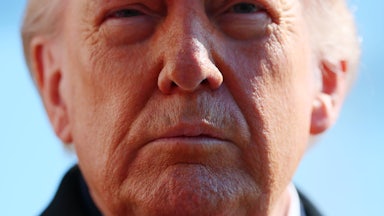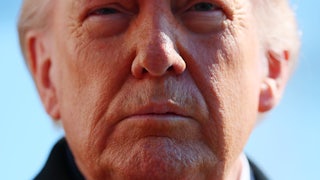Of course, it wasn’t aliens. The sudden increase in unidentified flying objects over the past week has been thrilling and mysterious—and the possibility of an extraterrestrial invasion during the Super Bowl (or better yet, during Rihanna’s halftime show) infused the news of the day with a distinct Mars Attacks!-y flavor. While much of the country has opted to move on from the global pandemic that shut down the world three years ago, an ambient apocalyptic aura has remained in place: an airborne toxic event in Ohio, an ongoing land war in Europe, now a fleet of UFOs. Sure, why not?
Obviously, no one was dealing with bona fide extraterrestrials, but the possibility that it was that kind of UFO—helped along by military figures who refused to discount the idea—at least lent a degree of levity to the situation. The flying objects that have been shot down over the last week all appear to be man-made; it is likely that all or most of them were produced by China for the purpose of aerial reconnaissance.
This is unnerving but not especially shocking: The United States and China are competing great powers who are growing increasingly suspicious of one another; no one should be surprised that the two nations are spying on one another. Not much is known beyond this fact. The consensus is that the first spy balloon, which was shot down over a week ago, was probably collecting information on American military bases or testing the U.S. military’s ability to detect and respond to intrusions, possibly both. Less is known about the subsequent devices that have been shot down in the U.S. and Canada, which may not even be Chinese.
There may be something “silly season” to the balloon news cycle, but the larger pattern of increased suspicion, heightening tensions, and general great power competition is a serious matter—one made exponentially worse by the response, from both political officials and the media. The information vacuum that’s opened is being exploited by China hawks to push fantastical ideas. As my colleague Michael Tomasky pointed out on Monday, the right-wing media has relentlessly hyped bizarro balloon theories. Republican politicians and right-wing commentators have tried to call a tune favorable to their interests, steeped in fantasies of submission and weakness. What’s been obscured is the actual U.S. policy on China, and the escalation of needless risk.
The funhouse mirror distortions began almost as soon as the first balloon appeared over Montana, with Republicans hectoring the president for not ordering the craft to be shot down as soon as it was known to exist. “President Biden should stop coddling and appeasing the Chinese communists. Bring the balloon down now and exploit its tech package, which could be an intelligence bonanza,” said Arkansas Senator Tom Cotton earlier this month. (The administration waited to act until the balloon reached the Atlantic Ocean, citing safety concerns relating to debris and the fact that its “payload” would be easier to recover in water.)
The fact that subsequent crafts have been shot down has been cited again and again as proof of, well—something. “So we can shoot down suspicious objects BEFORE they get over our border.… Just as I suggested,” tweeted Kansas Senator Roger Marshall. Donald Trump, meanwhile, boasted that none of this would have happened were he still president—which, to be fair, is what he always does. “Chinese would never have floated the Blimp (“Balloon”) over the United States if I were President!!!” he wrote on his blog.
Meanwhile, House Oversight Chair James Comer dug deep into conspiratorial lore. “My concern is that the federal government doesn’t know what’s in that balloon. Is that bioweapons in that balloon? Did that balloon take off from Wuhan? We don’t know anything about that balloon.” What if the balloon was shaped like a horse and was full of warriors? What if it were full of gender-noncomforming candies!
Donald Trump, take note! These responses indicate that conservative elites still hunger for a strongman—someone who can puff out their chest and scare the Chinese into submission. For everyone without daddy issues, this is bad foreign policy, generally speaking, and especially bad when dealing with the Chinese. There’s no indication that bluster will move the Chinese regime in our direction or magically transform relations between the two countries; moreover, there’s no reason to believe that shooting down a balloon at a slightly earlier time would have markedly changed things.
These comments also largely ignore the fact that the Biden administration has been tough on China—tougher than Donald Trump, in fact. Biden’s simply swapped vacuous saber-rattling for hard-nosed industrial policy. The Biden administration has worked strenuously to decouple the U.S. and China, particularly when it comes to the export of superconductors. There is a strong argument that any increase in spying on China’s part is the result of Biden’s aggressive foreign policy, rather than an indication of its weakness—a reflection that the ongoing economic warfare has significantly ratcheted up tensions.
This is a delicate and evolving situation that has been particularly badly served by bellicose and belligerent public statements. But that’s what the Republican Party does now—they live in a world where it somehow makes sense to stuff a balloon with bioweapons and send it around the world in 80 days for “reasons.” The conducting of well-considered foreign policy is a tertiary concern, lagging behind the creation of Fox News–ready soundbites, disseminating pictures of you pointing your AR-15 skyward, and waiting for the next balloon to float by.










